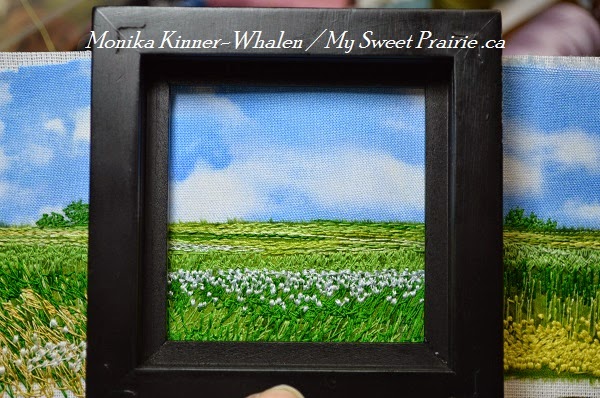 |
| loose land-and-sky combinations |
I'm working on three 'minis' here. I'm not working from photos as I usually do. (That's a big first for me!) Each landscape will be about 3x3" square. That's really tough to hold, so I thought I would put then in a row and work on them like this so I have more to hang on to as I manipulate the pieces under the machine needle.
I have piles of fabrics. It doesn't matter much to me whether they are hand dyes or commercial batiks. I'm just looking for the right colour for the job. The placed fabrics are fused onto a tough, stiff cotton weave, and then further stabilized. I love stabilizer. I hate puckering. I use Sulky Peel&Stick exclusively (see sponsor link on sidebar). It's my favourite.
Then I start stitching. I put down the thread from farthest point to closes point. Typically, the distant horizon will have shorter stitch lengths than the foregound. And so, with my box of hundreds of tints, tones, and shades of green - I begin! (This is a different trio, bit I thought the photo was clearer.)
I stitch some up. I stitch some to the side. This is purely experimental. I have no idea of how these will turn out. So far, I've used four different greens. I pick a few more variations of greens and I keep sewing. This is all free-motion stitching - sometimes straight stitch and sometimes zigzag. I've used decorative stitches just for effect when I need a really random look.
Every now and then, I place a working mat on top just to see how the composition is coming along. These pieces are bigger than what you'll view once it's in the frame. I need to be sure that the flowers I stitch will be in the scene and not out of the 'margin'. Using a working mat helps keep it all in balance.
Here I'm adding canola by machine. I usually do this by hand in my larger pieces, bit this is so small to fiddle with, I find the free motion can get the effect I'm wanting for these minis.
I often 'sew upside-down'. You are seeing the last image from my point of view while working. Because I stitch back to front (horizon to foreground), I find that I can see where I'm stitching easier if the piece has it's finished portion facing me, and the unstitched cloth yet behind the needle.
After it's all filled in, I clean up the work. I adore small, sharp snips that are curved. My snips MUST be curved. Too many times I have used fancy-schmancy staight embroidery scissors and damaged the work. Curved snips are best for me - see how they don't touch or poke or get caught in any other threads?
 |
| snip |
These are Singer embroidery scissors, and are just like cuticle scissors from the pharmacy.
One last check with the potential frame and I think it's done. I like it! : )
And here's another with blue flax. I may still add trees out on the far horizon. I'm not sure yet. There's something beautiful to me about the openness.
 |
| a little flax |
There you have it. I'm not sure which of these will end up where. Some will go to Handmade House, and some will be stockpiled for Roulleau / Dog River Days Farmers' Market at the end of the month.
p.s. Isn't the colour great in these photos!? I'm working at night here with no sunshine whatsoever. I LOVE the day bulbs and my ottlight so much. : )
Have a great weekend, and I hope you are enjoying summer!
















15 comments:
Fascinating to see some of your process, I'm a big fan of your work :)
Thoroughly enjoyed seeing your process Monika, thanks for sharing. Do you tie off any stitches, or pull threads to the back of the fabric?
Thanks for sharing...and wow, wow and wow again. Your work is amazing.
Thanks for sharing how you work on your "minis". You and your work are really inspiring! I hope to see it in person at a market someday soon!
Uma aula preciosa! Obrigada!
Um abraço!
A valuable lesson! Thank you!
Hugs!
Egléa
Thank you for sharing your process. Your work is so beautiful!
http://mysweetprairie.blogspot.ca/2014/01/work-in-progress.html
Here's a more lengthy process post of a large piece I did this year - Hills at Blackstrap
: )
Thanks everyone!
Monika
The tip I picked up was the mat check -- a few of my landscapes have had their trees lost at the end.
I'm also a fan of the wide open prairies so love the one where you didn't add trees. Just remember as an ambassador for Saskatchewan (which you now are with your work going everywhere) not to portray as too often as that flat land where you can see your dog run away for 3 days! I can't even see mine run away for 3 seconds without losing site of him.
Love your work as you well know and am glad that you are getting a great work space.
Bernie
Lovely to see your process Monika, thank you. xx
Monika, Thanks for taking the time to share your process. I live in a midwestern state in the USA with not much sun and I totally GET your work. You have such an amazing eye for detail and finding the color in the prairie. You are such an inspiration to those of us who read your blog.
Always smazing to see! And it's a gift to hear about your process!
Loved seeing your process! Wonderful textural pictures.
I'm wondering about your daylight bulbs-- what kind they are and the wattage. I saw some recommended on a blog but haven't been able to get them here.
:)
I know. I know.
But I do adore the big flat unobstructed views. That's what sings to me. I stitch what I love. I will do more hillsides, but if I have to love the scene or I just can't. :)
Thanks Bernie :)
Thank you Monika for this commentary on your process - you have been a great inspiration to me as a want to be mini quilt artist :)! I first heard about you on Canadian Quilt Talks.
I'd like to ask a question - when free motion quilting, how do you get those really long stitches in the foreground?
I am not a machine embroiderer - yet - your tutorial makes it look so enticing and not so difficult. You have a great eye, and this post was inspiring. Thank you.
Post a Comment